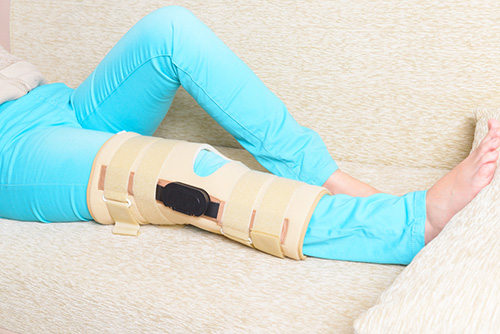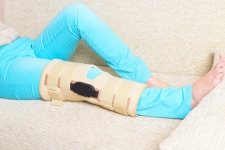Often times, it’s the first 24 hours after surgery that surprise people the most. Why is that? Well, because both your orthopaedic surgeon and your physical therapy team will want you to start the process of getting out of bed and taking your first steps with your new knee (typically with a walker). Your physical therapists will teach you how to do things like how to get in and out of bed, how to get out of a chair, and the best way to manage stairs.

By the second day, your nurses and physical therapists will bump up the level of your activity just a bit – this includes taking more than just a few steps (such as walking across your hospital room with a walker) and even walking up and down a few steps. The stairs portion is especially important if you have steps that you’ll need to be going up and down at home – that’s something that you’ll definitely want practice with before leaving the hospital.
For the remainder of your time in the hospital, your activity level will continue to increase. Your orthopaedic surgeon will want to make sure that the range of motion of your new joint is steadily improving. They’ll also want to ensure that you can straighten the joint. You’ll continue to work on walking, sitting, and standing, too.
After you leave the hospital, you’ll have several follow-up appointments with your orthopaedic surgeon as well as a set schedule of visits with your physical therapist. It should be noted that physical therapy post-knee replacement can be a challenge. If you’re diligent about doing your prescribed exercises, you’ll regain your mobility and ability to perform your daily activities, sooner. By the six week mark you should no longer be needing the assistance of a cane or walker, and should be able to resume driving, etc.
At the twelve week mark, low-impact activities such as walking, bicycling, and swimming can often times be added back in to your exercise routine if your orthopaedic surgeon says it’s OK. It’s important to remember, though, that high-impact items like running, aerobics, and contact sports should be avoided as they can cause damage to your new joint.
The vast majority of knee replacement patients are able to enjoy their post-operative life with a substantial reduction in pain and increased quality of life, which is exactly what we strive for with each and every patient who comes through our doors. If you’re suffering with knee pain, please don’t hesitate to give us a call and schedule an appointment with Dr. Hurlbut here at Prairie Orthopaedic and Plastic Surgery PC.
source: kneereplacement.com

